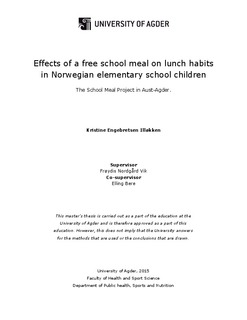Effects of a free school meal on lunch habitsin Norwegian elementary school children The School Meal Project in Aust-Agder.
Master thesis
Permanent lenke
http://hdl.handle.net/11250/299763Utgivelsesdato
2015Metadata
Vis full innførselSamlinger
Sammendrag
Norway has no national arrangement for a free served school meal. This has led to mainly two concerns: that many children may attend school without eating a healthy meal throughout the school day, and that many children may skip their lunch. The aim of this study was to investigate if a free healthy school meal had impacts on children’s intake of different foods during the lunch, and thereby contribute to a healthier diet at school.
The School Meal Project is an intervention and has a quasi-experimental study design- with an intervention and a control group. A total of 55 (96%) children in the intervention group and 109 (67%) children in the control group, all aged ten to twelve years, answered on a questionnaire at two time points with a six-month interval. Results were evaluated with a healthy food score consisting of thirteen food items, which was calculated based on a food-frequency questionnaire section. Chi-Square and Independent Samples Test was used to examine the hypothesis. The results showed that the total food score increased significantly at follow-up 1, more in the intervention group (1.7) compared to the control group (0.5), p=0.008. The change in the total food score was mainly due to an increase in the intake of fruit (p=<0.001), vegetables (p= 0.001), and fish spread (p=0.022) among children in the intervention group compared to the control group. In conclusion, serving of a free healthy school meal increased children’s intake of healthy food products. Further studies are needed to clarify effects on school meal and impact on health- and school-outcomes and possible long-term effects.
Beskrivelse
Masteroppgave folkehelsevitenskap- Universitetet i Agder, 2015
